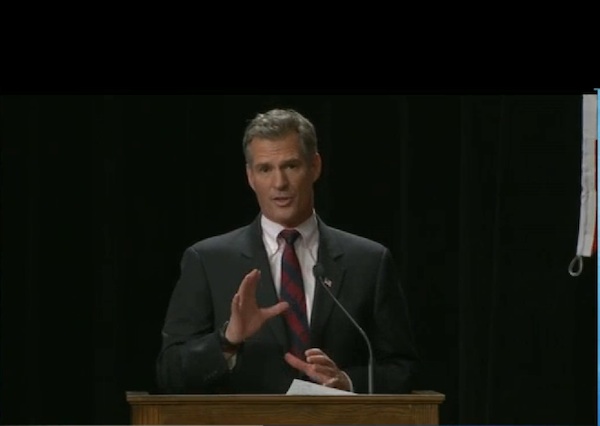Super PACs Would Have a Blast with Brown's Afghanistan Service

A Globe story’s critique of the way Scott Brown portrays his two week stint in Afghanistan with the National Guard is probably a good occasion for Brown to thank goodness he signed a pact banning third party television advertising from his Senate race.
When Brown noted that he “served in Afghanistan” during this week’s debate with Elizabeth Warren, his critics jumped to define what just what that service entailed. Glen Johnson’s story in the Globe delicately noted that “since being elected to the Senate in 2010, his service has taken on a political patina,” which is a very polite way of saying that he’s using his service to score political points. Johnson writes:
Brown, though, returned [from Afghanistan in 2011] not as a veteran of a protracted period of duty but after a 14-day Army National Guard assignment he requested. During that span, he spent seven days in Afghanistan itself.
While there, he participated in training exercises with the troops, but he also spent considerable time meeting with generals, ambassadors, and other leaders, an experience more akin to his role as US senator.
Globe columnist Brian McGrory put it far less politely:
Served in Afghanistan? Scott Brown?
Yes, technically, Scott Brown is right. He is a longtime member of the Army National Guard, and as a United States senator, in the summer of 2011, he requested that his annual two weeks of guard training be done in Afghanistan, where he would be located “in the rear with the gear,” according to one analyst at the time.
So Scott Brown “served” in Afghanistan. For less than two weeks. Let’s be honest, it was more like a visit
Partisans on Twitter have taken up the cause today. But conspicuously not among them is Elizabeth Warren, whose Twitter feed has focused on Brown’s record on women’s issues this morning. We imagine the campaign will probably continue to avoid the topic. History shows that it’s a pretty difficult trick to attack a political opponent’s military service. It’s easier, though, to let someone else attack your opponent’s military service. (See: George W. Bush and the Swift Boat Veterans for Truth.) This is exactly the kind of issue where we can basically write the script for a well-funded Super PAC ad campaign. (Picture: wounded veterans speaking to the camera. “Scott Brown says he served in Afghanistan…” etc.) Of course, Warren and Brown have engaged in an historic agreement to keep third party advertising out of the campaign, and we think Warren risks looking sleazy by running that kind of campaign herself. So on this issue, the pact is good news for Brown.


